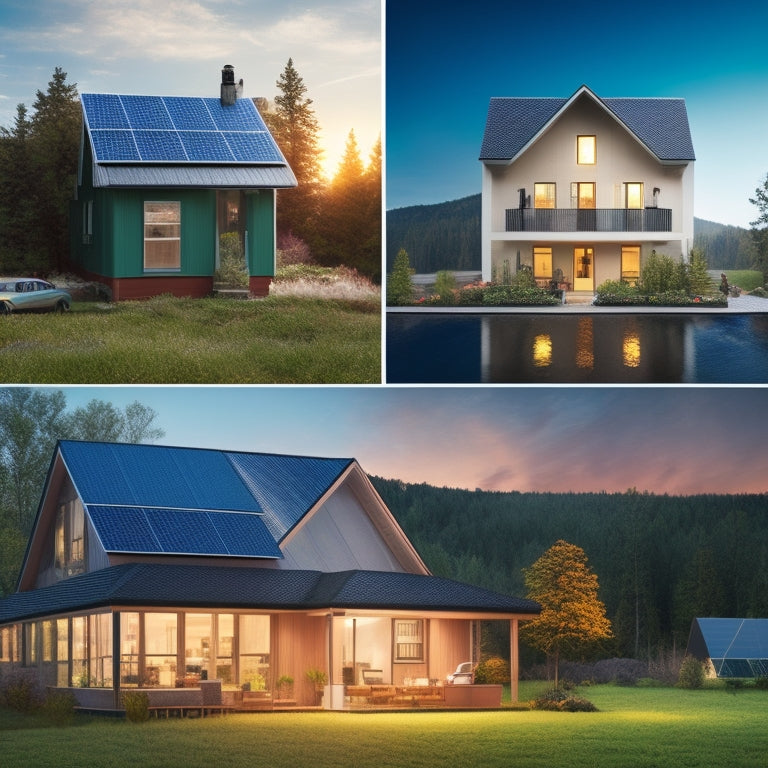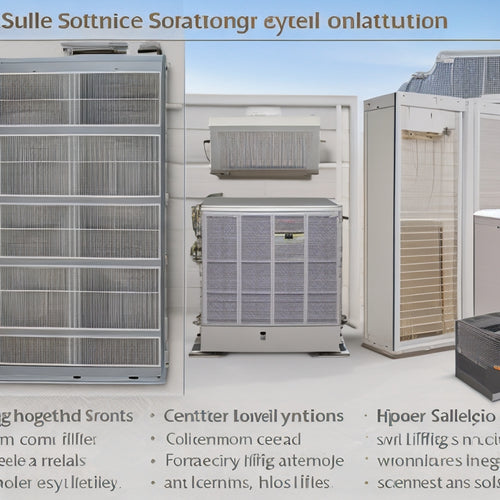
What Does Your Home Energy Audit Report Reveal?
Share
Your home energy audit report reveals a detailed analysis of your energy consumption patterns, highlighting areas of energy loss and opportunities for improvement. It identifies air leaks and infiltration points, evaluates the performance of your insulation and ventilation, and assesses the efficiency of your heating and cooling systems. The report also examines your lighting and appliances, pinpointing energy-hungry culprits and suggesting upgrades to energy-efficient alternatives. By reviewing your report, you'll gain a deeper understanding of your energy usage and uncover potential cost savings - and with that, you'll be well on your way to creating a more energy-efficient, cost-effective, and sustainable home.
Key Takeaways
- A home energy audit report reveals areas of energy loss, providing recommendations for energy efficiency improvements and potential cost savings on energy bills.
- The report assesses the performance of heating and cooling systems, identifying opportunities for technology upgrades to reduce consumption and bills.
- Insulation levels and effectiveness are evaluated, highlighting areas needing improvement to prevent heat loss and energy waste.
- The report identifies energy-hungry appliances and lighting, suggesting energy-efficient alternatives to lower operating costs and reduce environmental impact.
- The report provides a detailed breakdown of energy consumption, helping homeowners prioritize improvements and make informed decisions about energy-efficient upgrades.
Understanding Energy Consumption Patterns
About 40% of your home's energy consumption is attributed to heating, cooling, and ventilating. This significant portion of your energy usage is a clear indicator that optimizing your heating, ventilation, and air conditioning (HVAC) system is essential.
By understanding your energy consumption patterns, you can identify areas for improvement. Analyzing your energy usage trends and consumption benchmarks will help you pinpoint opportunities to reduce energy waste and lower your utility bills.
Implementing regenerative braking systems and energy storage solutions can also contribute to energy efficiency. Your energy audit report provides a detailed breakdown of your energy consumption, allowing you to make informed decisions about upgrades, retrofits, and behavioral changes that will give you greater control over your energy usage and costs.
Identifying Air Leakage and Infiltration
You've taken the first step in understanding your energy consumption patterns, and now it's time to focus on another critical aspect of home energy efficiency: identifying air leakage and infiltration.
Air leakage occurs when outside air enters your home through gaps and cracks, while infiltration happens when warm air escapes through these same openings. By implementing sustainable energy solutions, such as solar-powered charging, you can reduce your carbon footprint and energy waste.
Your home energy audit report will highlight areas where air sealing is necessary to prevent heat loss and moisture damage. Thermal imaging technology may be used to detect hidden gaps and cracks, allowing you to prioritize air sealing efforts.
Insulation and Ventilation Performance
Three key components of a well-insulated home are airtight construction, adequate insulation, and proper ventilation. Your energy audit report will assess the performance of these components, identifying areas for improvement.
The report will evaluate the effectiveness of your insulation materials, such as fiberglass, cellulose, or spray foam, and determine if they're sufficiently installed. It will also examine your ventilation strategies, including whole-house ventilation systems, to guarantee they're providing a healthy indoor air quality.
Moreover, optimizing your solar panel array design solar panel array can also contribute to energy efficiency, and selecting energy-efficient equipment can minimize losses and reduce operating costs.
Lighting and Appliance Efficiency
Your home's lighting and appliances are significant contributors to your energy consumption.
Our audit has identified the energy-hungry culprits in your home, including incandescent bulbs and inefficient appliances.
Importantly, switching to energy-efficient alternatives can lead to lower operating costs and a reduced carbon footprint.
You'll be pleased to know that efficient alternatives exist, and we'll examine these options further in this report.
Energy-Hungry Culprits Identified
While conducting the home energy audit, a thorough examination of lighting and appliances revealed several energy-hungry culprits that greatly contribute to your energy consumption.
You'll likely find that incandescent bulbs, halogen lamps, and old appliances are significant contributors to your energy waste. These inefficient devices can increase your utility bills and hinder your energy management efforts.
Additionally, installing Level 2 Charging Stations can also impact your energy consumption, especially if you have an electric vehicle.
The audit report will pinpoint which specific lighting fixtures and appliances are draining your energy resources, providing you with a clear understanding of where to focus your energy-saving efforts.
Efficient Alternatives Exist
Many inefficient lighting fixtures and appliances in your home can be replaced with energy-efficient alternatives, greatly reducing your energy consumption.
By switching to LED bulbs, Energy Star-certified appliances, and smart devices, you'll not only reduce your energy bills but also contribute to a more sustainable future.
Renewable energy sources, like solar panels, can also be integrated into your home's energy management system.
Additionally, adopting eco-friendly solutions, such as green building materials and passive design principles, can further minimize your environmental footprint.
Don't forget to investigate utility incentives and demand response programs that reward energy-efficient practices.
Heating and Cooling System Analysis
The furnace in your basement and the condenser unit outside are the heart of your home's heating and cooling system, working tirelessly to maintain a comfortable indoor climate.
Your home energy audit report reveals the performance of these essential components, highlighting potential areas for improvement.
-
Efficiency ratings: Your report shows the current efficiency ratings of your heating and cooling system, giving you an idea of how well it's performing compared to modern standards.
-
System maintenance needs: The report identifies any necessary maintenance tasks to guarantee your system runs smoothly and prolongs its lifespan.
-
Technology upgrades opportunities: You'll find out if upgrading to newer, more efficient technologies could greatly reduce your energy consumption and bills.
Opportunities for Energy Savings
You've taken the first step towards reducing your energy consumption by understanding your home's energy usage patterns.
Now, let's identify opportunities to maximize energy efficiency gains, uncover hidden energy losses, and pinpoint cost-cutting opportunities that will have a direct impact on your wallet.
Energy Efficiency Gains
How can you access significant energy savings in your home? By implementing energy-efficient solutions, you can reduce your energy consumption and lower your utility bills.
Your energy audit report reveals opportunities for energy savings through:
-
Eco-friendly upgrades: Install energy-efficient appliances, LED lighting, and insulation to minimize heat loss.
-
Behavioral changes: Develop sustainable practices, such as turning off lights and electronics when not in use, to reduce energy consumption.
-
Smart technology integration: Invest in renewable energy sources, like solar panels, and employ energy management systems to optimize energy usage.
Hidden Energy Losses
While implementing energy-efficient solutions can yield significant savings, hidden energy losses often remain undetected, quietly draining your resources.
Your energy audit report reveals these hidden losses, allowing you to take corrective action. Thermal imaging, for instance, can detect energy loss through the building envelope, identifying areas where air barriers and draft prevention measures are needed.
Effective moisture management is also vital, as excess moisture can lead to energy loss and compromise thermal comfort.
Cost-Cutting Opportunities
Efficiency unfolds when your home's energy-saving potential is fully utilized.
Your home energy audit report reveals opportunities to cut costs and reduce your environmental footprint. By implementing these changes, you'll enjoy lower energy bills and a clearer conscience.
Here are three cost-cutting opportunities to contemplate:
-
Seal air leaks: Caulk and weatherstrip around doors and windows to prevent heated or cooled air from escaping.
-
Upgrade to energy-efficient appliances: Replace old appliances with Energy Star-rated ones to reduce energy consumption.
-
Explore solar panel options: Think about investing in renewable energy sources, such as solar panels, to capture the power of the sun and reduce your reliance on traditional energy sources.
Frequently Asked Questions
Can I Perform a Home Energy Audit Myself or Should I Hire a Pro?
You can DIY an energy audit, but hiring a pro provides expert analysis, specialized equipment, and personalized recommendations, ensuring a more thorough assessment and maximizing energy-saving opportunities and potential rebates.
How Long Does a Typical Home Energy Audit Take to Complete?
You'll be surprised to know that the average American home wastes 30% of its energy; now, when it comes to your audit, expect it to take around 2-4 hours to complete, depending on the audit duration and assessment factors like your home's size and complexity.
Will the Auditor Need Access to Every Room in My Home?
You'll need to grant the auditor access to every room in your home, as they'll assess room accessibility and perform tests during the audit process, ensuring a thorough evaluation of your home's energy efficiency.
Are Energy Audits Only for Old or Inefficient Homes?
As you turn the key to your energy-hungry castle, you wonder: are energy audits only for old or inefficient homes? Not necessarily; they're for any homeowner seeking to access cost savings and energy efficiency, regardless of age or condition.
Will the Report Provide a Prioritized List of Recommended Improvements?
You'll get a prioritized list of recommended upgrades, detailing energy savings you can expect from each, allowing you to strategically invest in your home's efficiency and freedom from high energy bills.
Related Posts
-

Why Solar HVAC Filters Revolutionize Home Energy Efficiency
By adopting solar HVAC filters, you're shifting your home's energy reliance from fossil fuels to clean, renewable sou...
-

5 Efficient Air Circulation Methods for Green Homes
You can utilize the power of natural ventilation techniques, whole house fans, and solar-powered ventilation systems ...
-

Why Biodegradable Dish Soap Matters for Earth-Conscious Homes
You likely don't realize that the dish soap you're using today will still be harming the environment long after you'v...


